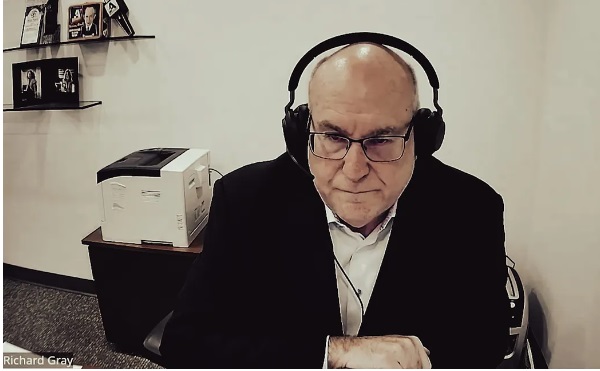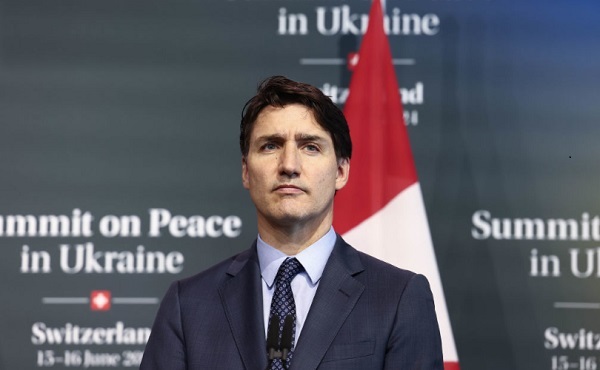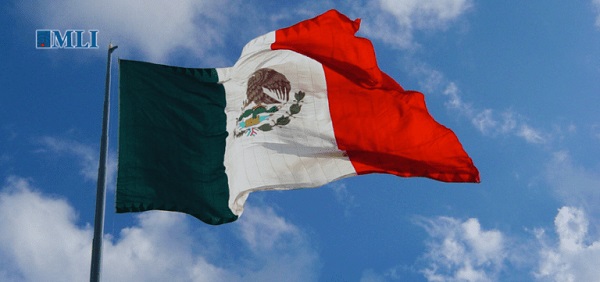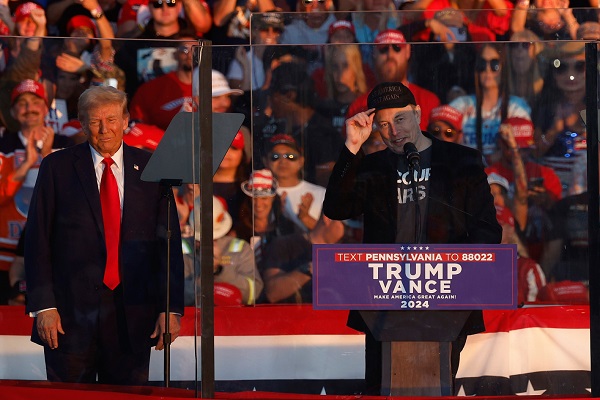National
Inside the Shocking Parliamentary Ethics Hearing That Reveals the Depth of Media Bias in Canada

CTV’s Richard Gray
“CTV spliced together three short soundbites… to create an entirely made-up sentence. Literally fake news that entirely changed the meaning of what Pierre Poilievre said.” — Michael Cooper
It’s no secret that the mainstream media is a propaganda machine for the liberal elite, but the recent Parliamentary Ethics Committee hearing exposed just how deep this rot goes. The first hour of the committee meeting was a clinic on media corruption, and guess what? CTV News is at the center of it. This isn’t some tiny newsroom mistake—we’re talking about the manipulation of news to actively undermine Conservative leader Pierre Poilievre.
Let’s break down what we saw in that first hour, because it’s a lot more than just journalistic malpractice—it’s corporate media colluding with Trudeau’s Liberals to smear their political opposition.
CTV Gets Caught Red-Handed
In September 2024, CTV ran a story about Pierre Poilievre’s opposition to Trudeau’s carbon tax. Sounds simple, right? Except that the clip CTV aired wasn’t Poilievre’s actual words. They spliced together three different soundbites, in a way that fabricated an entirely new message. They deleted Poilievre’s key reference to the “carbon tax election,” making his comments sound more benign than they were.
The outcome? Canadians saw a falsified version of Poilievre’s stance on one of the most critical issues facing voters. And, surprise, surprise—it conveniently played into Trudeau’s hands by diluting Poilievre’s criticism of the carbon tax.
CTV’s manipulation wasn’t exposed by some internal review or journalistic conscience. No, it was called out by a Conservative staffer. Let that sink in. The most trusted name in Canadian news, caught fabricating news to attack the leader of the opposition—only to issue an apology after being called out.
Michael Barrett Drops the Hammer
The star of this hearing? Conservative MP Michael Barrett. He didn’t pull any punches when he confronted Richard Gray, Vice President of CTV News. Barrett’s opening salvo hit at the heart of the issue: “We’ve seen a lot of examples of CTV acting as activism masquerading as journalism.”
And he’s right. Barrett systematically tore apart CTV’s defense, pointing out that this wasn’t some innocent error. CTV deliberately altered Poilievre’s statements to undermine him politically. Barrett challenged Gray to explain why CTV had turned into an arm of Liberal propaganda, essentially parroting Trudeau’s talking points in their coverage.
Gray’s response? The same tired excuse we’ve heard time and again—“It was a mistake.” Well, no, it wasn’t. You don’t accidentally splice soundbites together to create a new sentence. That’s deliberate manipulation. And you certainly don’t edit out key phrases like “carbon tax election” without knowing exactly what you’re doing.
Barrett’s performance was masterful, exposing Gray’s weak defense and making it clear that CTV can’t be trusted to cover conservative leaders fairly. And why would they? Their cozy relationship with Trudeau and his Liberal government guarantees them favorable treatment, including regulatory relief worth millions.
Media-Political Collusion Exposed
Here’s where it gets even more disturbing. CTV is owned by Bell Media, a corporate giant that benefits directly from the Liberal government’s policies. Andrew Scheer hammered this point home during his cross-examination. Scheer pointed out that while CTV loses millions in its news operations, Bell Canada profits off government regulatory favors—to the tune of $40 million in “regulatory relief.” So, you think Bell Media has an incentive to help Trudeau out? Absolutely.
This isn’t just about biased reporting. This is about a corrupt relationship between a corporate media empire and the Liberal government. Trudeau’s regime is propping up CTV with regulatory favors while CTV is turning around and attacking Conservative leaders. It’s not a conspiracy theory—it’s fact.
Richard Gray’s Pathetic Defense
What was Richard Gray’s defense? Predictable. He fired two employees and insisted that this was an isolated incident. But here’s the kicker—Gray never even spoke to those employees directly to find out their intent. That’s right, the head of CTV News didn’t bother to personally investigate the two people who altered the clip of Poilievre. Instead, Gray claimed there was no “malicious intent” based on an internal investigation he didn’t personally conduct.
Even Liberal MP Anthony Housefather, who was hardly interested in holding CTV accountable, pressed Gray on this point. Housefather rightly asked how Gray could possibly testify about the employees’ intent if he never personally interviewed them. The answer? He couldn’t.
Gray kept repeating the same line—that there was no malicious intent—but how could he know? The truth is, CTV got caught, and now they’re scrambling to limit the damage without addressing the deeper issue of institutional bias.
NDP and Bloc MPs Play Softball
To no one’s surprise, the NDP and Bloc Québécois didn’t push CTV nearly hard enough. René Villemure of the Bloc briefly raised the question of whether CTV was dealing with just the consequences and not the intent behind the manipulation, but Gray dodged, and Villemure let it slide. Meanwhile, Matthew Green of the NDP expressed concerns about the incident undermining public trust but failed to dig deeper into why these mistakes always seem to hurt conservatives and help Liberals.
Here’s what the NDP and Bloc MPs missed: This isn’t just about one bad news clip. It’s about the systemic bias that runs through CTV and the rest of the mainstream media. These so-called “mistakes” always seem to happen when it comes to conservatives, don’t they? Funny how the Liberal government and its media allies get a free pass every time.
The Liberal-Media Swamp Is Real
This committee hearing made one thing crystal clear: CTV News is compromised. They aren’t interested in fair, unbiased reporting. They’re interested in maintaining their cozy relationship with the Trudeau government and attacking anyone who dares challenge Liberal orthodoxy.
Richard Gray’s weak defense and the media’s failure to self-police is just another sign that the swamp runs deep in Canada. Mainstream media outlets like CTV aren’t just making “mistakes.” They’re deliberately manipulating the news to protect their financial interests and political allies.
If you’re still watching CTV or any other mainstream outlet expecting fair coverage, you’re part of the problem. Turn them off. Find your news elsewhere. Because CTV—and the Liberal media establishment—sure as hell aren’t looking out for you.
Subscribe to The Opposition with Dan Knight .
For the full experience, upgrade your subscription.
Energy
Global fossil fuel use rising despite UN proclamations

From the Fraser Institute
By Julio Mejía and Elmira Aliakbari
Major energy transitions are slow and take centuries, not decades… the first global energy transition—from traditional biomass fuels (including wood and charcoal) to fossil fuels—started more than two centuries ago and remains incomplete. Nearly three billion people in the developing world still depend on charcoal, straw and dried dung for cooking and heating, accounting for about 7 per cent of the world’s energy supply (as of 2020).
At the Conference of the Parties (COP29) in Azerbaijan, António Guterres, the United Nations Secretary-General, last week called for a global net-zero carbon footprint by 2050, which requires a “fossil fuel phase-out” and “deep decarbonization across the entire value chain.”
Yet despite the trillions of dollars already spent globally pursuing this target—and the additional trillions projected as necessary to “end the era of fossil fuels”—the world’s dependence on fossil fuels has remained largely unchanged.
So, how realistic is a “net-zero” emissions world—which means either eliminating fossil fuel generation or offsetting carbon emissions with activities such as planting trees—by 2050?
The journey began in 1995 when the UN hosted the first COP conference in Berlin, launching a global effort to drive energy transition and decarbonization. That year, global investment in renewable energy reached US$7 billion, according to some estimates. Since then, an extraordinary amount of money and resources have been allocated to the transition away from fossil fuels.
According to the International Energy Agency, between 2015 and 2023 alone, governments and industry worldwide spent US$12.3 trillion (inflation-adjusted) on clean energy. For context, that’s over six times the value of the entire Canadian economy in 2023.
Despite this spending, between 1995 and 2023, global fossil fuel consumption increased by 62 per cent, with oil consumption rising by 38 per cent, coal by 66 per cent and natural gas by 90 per cent.
And during that same 28-year period, despite the trillions spent on energy alternatives, the share of global energy provided by fossil fuels declined by only four percentage points, from 85.6 per cent to 81.5 per cent.
This should come as no surprise. Major energy transitions are slow and take centuries, not decades. According to a recent study by renowned scholar Vaclav Smil, the first global energy transition—from traditional biomass fuels (including wood and charcoal) to fossil fuels—started more than two centuries ago and remains incomplete. Nearly three billion people in the developing world still depend on charcoal, straw and dried dung for cooking and heating, accounting for about 7 per cent of the world’s energy supply (as of 2020).
Moreover, coal only surpassed wood as the main energy source worldwide around 1900. It took more than 150 years from oil’s first commercial extraction for oil to reach 25 per cent of all fossil fuels consumed worldwide. Natural gas didn’t reach this threshold until the end of the 20th century, after 130 years of industry development.
Now, consider the current push by governments to force an energy transition via regulation and spending. In Canada, the Trudeau government has set a target to fully decarbonize electricity generation by 2035 so all electricity is derived from renewable power sources such as wind and solar. But merely replacing Canada’s existing fossil fuel-based electricity with clean energy sources within the next decade would require building the equivalent of 23 major hydro projects (like British Columbia’s Site C) or 2.3 large-scale nuclear power plants (like Ontario’s Bruce Power). The planning and construction of significant electricity generation infrastructure in Canada is a complex and time-consuming process, often plagued by delays, regulatory hurdles and substantial cost overruns.
The Site C project took around 43 years from initial feasibility studies in 1971 to securing environmental certification in 2014. Construction began on the Peace River in northern B.C. in 2015, with completion expected in 2025 at a cost of at least $16 billion. Similarly, Ontario’s Bruce Power plant took nearly two decades to complete, with billions in cost overruns. Given these immense practical, financial and regulatory challenges, achieving the government’s 2035 target is highly improbable.
As politicians gather at high-profile conferences and set ambitious targets for a swift energy transition, global reliance on fossil fuels has continued to increase. As things stand, achieving net-zero by 2050 appears neither realistic nor feasible.
Authors:
Business
Taxpayer watchdog calls Trudeau ‘out of touch’ for prioritizing ‘climate change’ while families struggle

From LifeSiteNews
The prime minister told a G20 panel this week that fighting so-called ‘climate change’ should be more important to families than putting food on the table or paying rent.
Canada’s leading taxpayer watchdog blasted Prime Minister Justin Trudeau for being completely “out of touch” with everyday Canadians after the PM earlier this week suggested his climate “change” policies, including a punitive carbon tax, are more important for families than trying to stay financially afloat.
In speaking to LifeSiteNews, Canadian Taxpayers Federation (CTF) federal director Franco Terrazzano said Trudeau’s recent comments show his government “continues to prove it’s out of touch with its carbon tax.”
“Canadians don’t support the carbon tax because we know it makes life more expensive and it doesn’t help the environment,” Terrazzano told LifeSiteNews.
Terrazzano’s comments come after Trudeau told a G20 panel earlier this week that fighting so-called “climate change” should be more important to families than putting food on the table or paying rent.
Speaking to the panel, Trudeau commented that it is “really, really easy” to “put climate change as a slightly lower priority” when one has “to be able to pay the rent this month” or “buy groceries” for their “kids,” but insisted that “we can’t do that around climate change.”
Terrazzano said that the Trudeau government’s carbon tax in reality “impacts nearly all aspects of life in Canada by making it more expensive to fuel up our cars, heat our homes and buy food.”
“The carbon tax also puts a huge hole in our economy that we can’t afford,” he said to LifeSiteNews, adding that if Trudeau really wanted to help Canadians and “prove it understands the struggles facing Canadians,” then it should “scrap the carbon tax to make life more affordable.”
On Thursday, Trudeau, who is facing abysmal polling numbers, announced he would introduce a temporary pause on the federal Goods and Services Tax (GST) for some goods.
Conservative Party of Canada leader Pierre Poilievre this afternoon said about Trudeau’s temporary tax holiday that if he is serious about helping Canadians, he would cut the carbon tax completely.
People’s Party of Canada (CPC) leader Maxime Bernier called the move by Trudeau a cheap trick to try and “bribe” Canadians, noting that it will not work.
“What a ridiculous gimmick. Bribing Canadians temporarily with borrowed money,” Bernier wrote.
“When the real solution is to stop growing the bureaucracy, cut wasteful spending, stop sending billions to Ukraine, eliminate subsidies to businesses and activist groups, stop creating new unsustainable and unconstitutional social programs, eliminate the deficit, and THEN, cut taxes for real. None of which he will do of course.”
As reported by LifeSiteNews, a survey found that nearly half of Canadians are just $200 away from financial ruin as the costs of housing, food and other necessities has gone up massively since Trudeau took power in 2015.
In addition to the increasing domestic carbon tax, LifeSiteNews reported last week that Minister of Environment Steven Guilbeault wants to create a new “global’ carbon tax applied to all goods shipped internationally that could further drive-up prices for families already struggling with inflated costs.
Not only is the carbon tax costing Canadian families hundreds of dollars annually, but Liberals also have admitted that the tax has only reduced greenhouse gas emissions by 1 percent.
-

 Brownstone Institute3 hours ago
Brownstone Institute3 hours agoThe Most Devastating Report So Far
-

 Economy15 hours ago
Economy15 hours agoCOP 29 leaders demand over a $1 trillion a year in climate reparations from ‘wealthy’ nations. They don’t deserve a nickel.
-

 Alberta13 hours ago
Alberta13 hours agoOn gender, Alberta is following the science
-

 Energy14 hours ago
Energy14 hours agoOttawa’s proposed emission cap lacks any solid scientific or economic rationale
-

 Bruce Dowbiggin2 hours ago
Bruce Dowbiggin2 hours agoCHL Vs NCAA: Finally Some Sanity For Hockey Families
-

 Brownstone Institute1 day ago
Brownstone Institute1 day agoFirst Amendment Blues
-

 Crime2 days ago
Crime2 days agoMexican cartels are a direct threat to Canada’s public safety, and the future of North American trade
-

 Business2 days ago
Business2 days agoDEI gone?: GOP lawmakers prep to clean house in federal government







